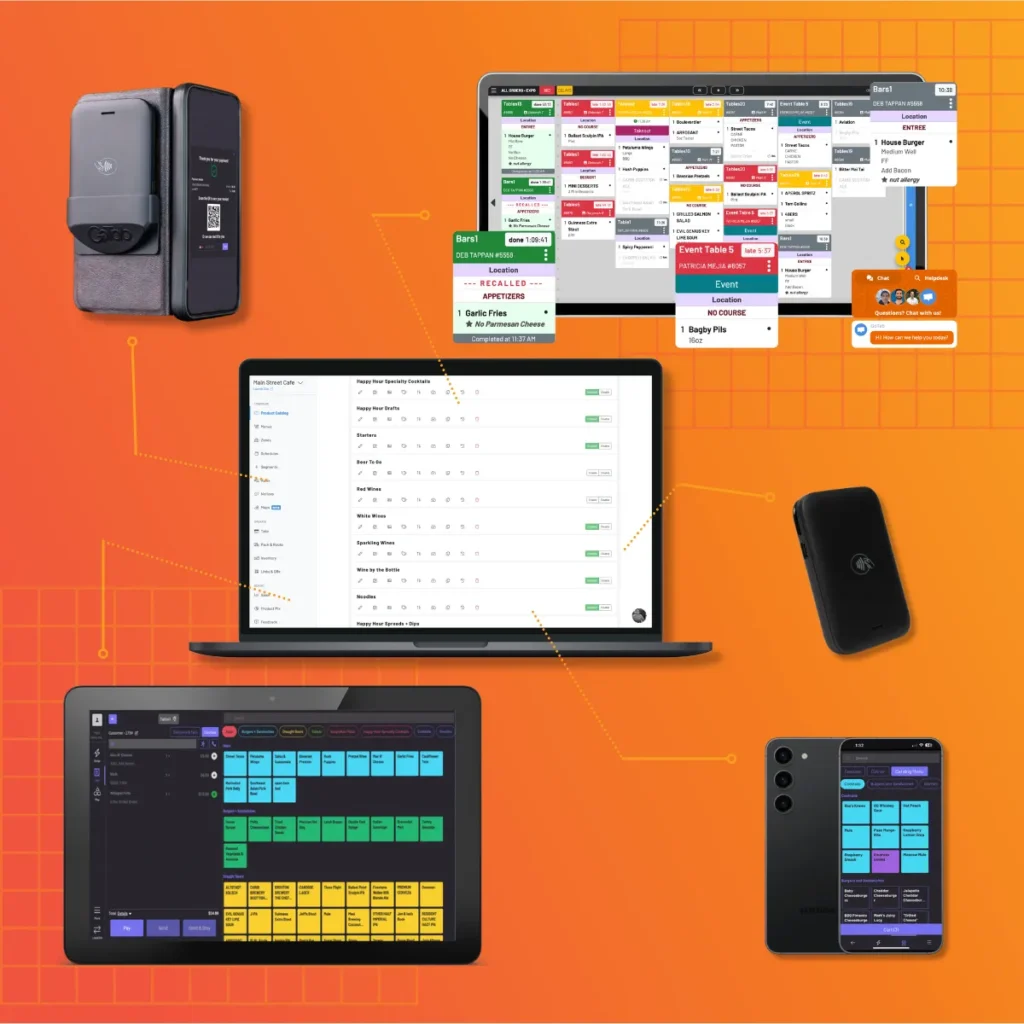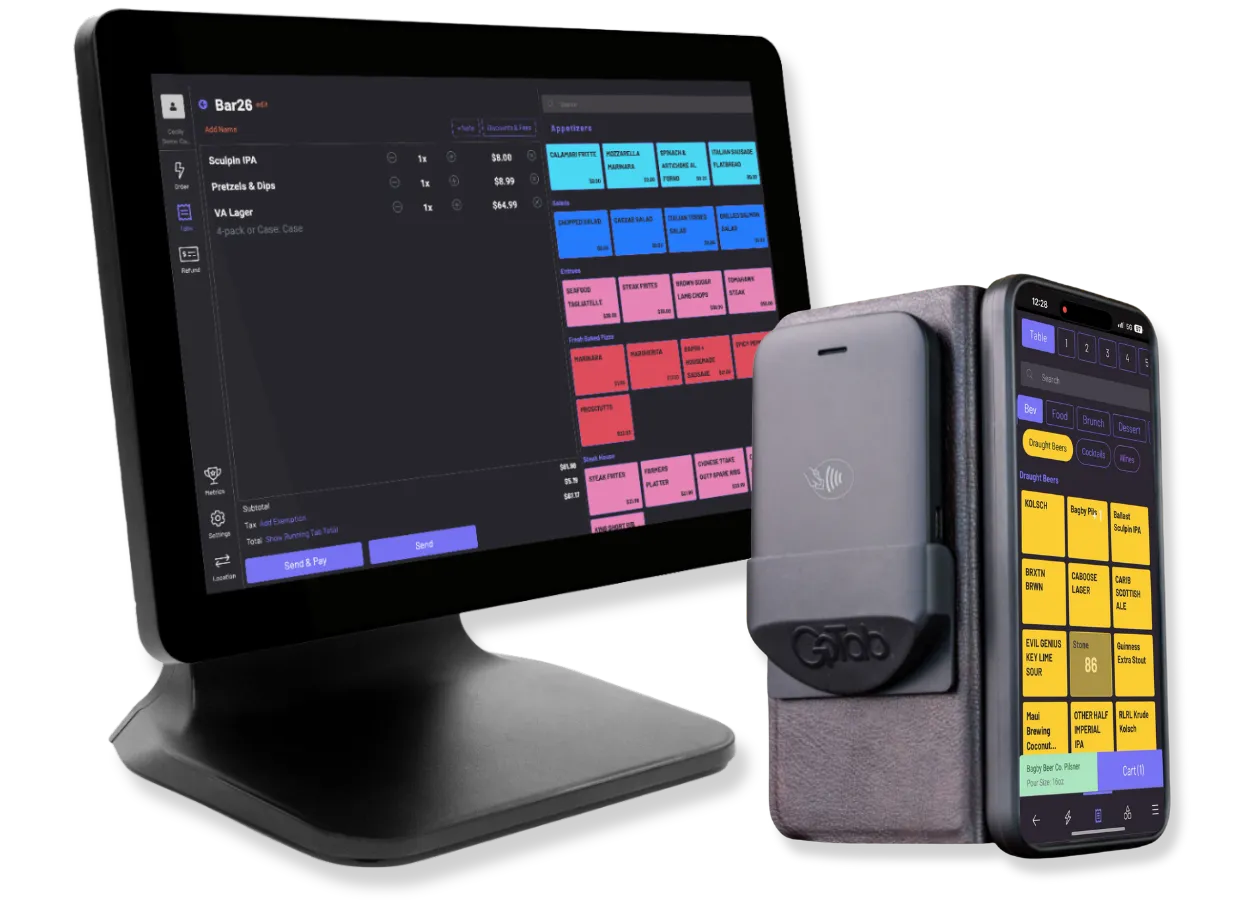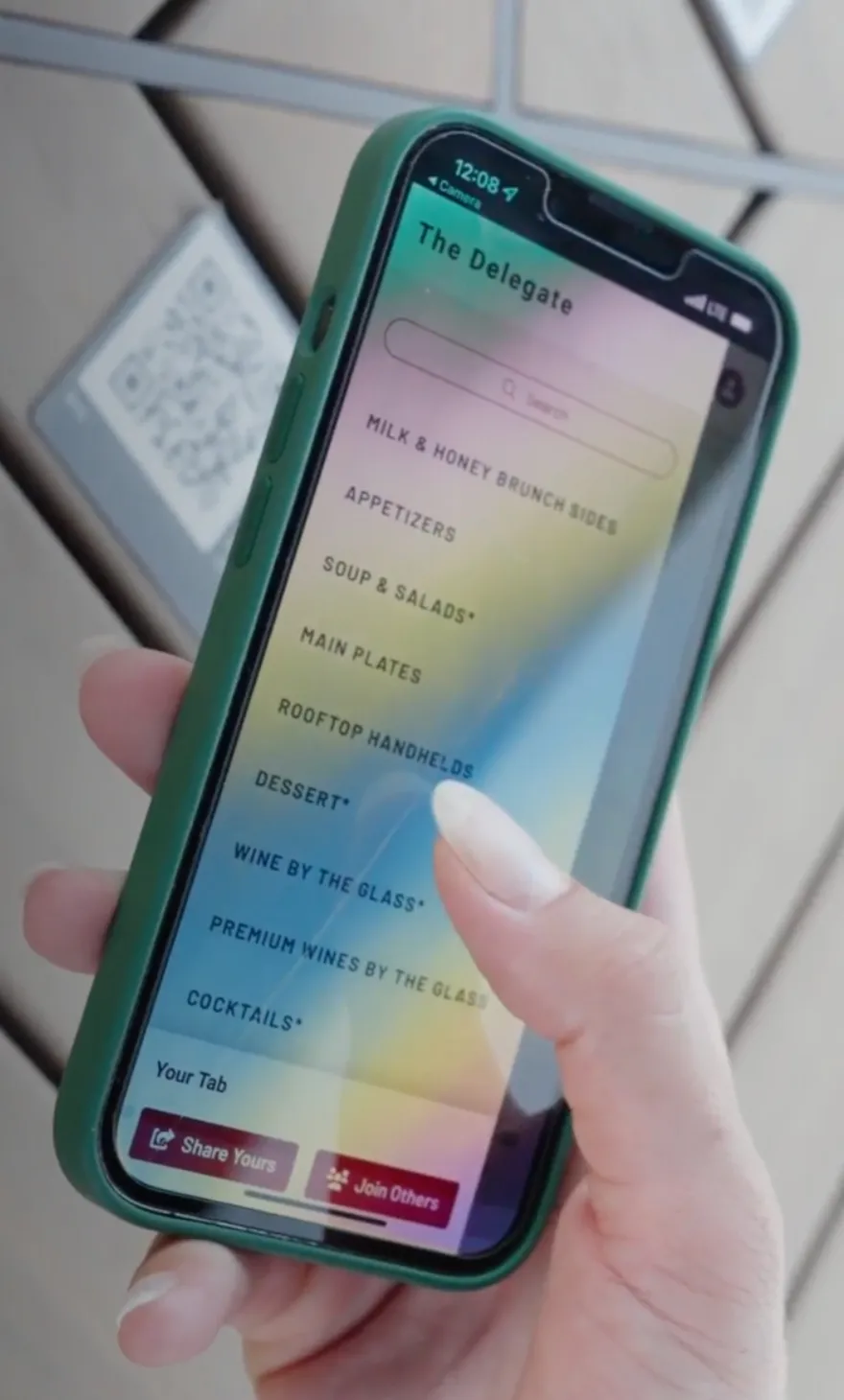
12.26.2023
In the rapidly evolving world of hospitality technology, GoTab stands out as a leading restaurant commerce platform. Founded in 2016 by Tim McLaughlin, the company, which recently completed an $18 million Series A funding round, now supports over 1,000 large- and mid-sized restaurants, breweries, bars, hotels, and other venues across 35 U.S. states and Canada. GoTab processes over $250M in transactions per year, offering solutions such as point-of-sale (POS) and property management system (PMS) integrations, mobile ordering and payment features, and kitchen management systems.
Before founding GoTab, McLaughlin led Siteworx, Inc., a mid-sized digital experience agency with clients including PayPal, Goldman Sachs, VeriSign, Bain & Co., and Thermo Fisher Scientific. After a successful private equity exit in 2013, McLaughlin and his wife co-founded Caboose Brewing Co., an upscale brewery and farm-to-table concept based in Fairfax, Virginia. As he explains in this interview, McLaughlin’s experience as a restaurateur greatly influenced the development of GoTab’s solutions, which aim to tackle the substantial inefficiencies that have persistently challenged the hospitality industry. The company’s platform tools are designed to empower every guest and staff member, enhancing the guest experience while increasing efficiency and profitability.

First off, congrats on the recent $18 million Series A funding round. How do you plan to utilize the investment? We’re thrilled about the successful completion of our $18 million Series A funding round, led by Truist Ventures. This significant investment will be strategically utilized to fuel our consistent growth and enhance existing solutions, such as our groundbreaking Pocket POS that puts the full power of a stationery POS in the palm of a server’s hand. The funds will also play a crucial role in supporting the development and execution of innovative products like our recently launched self-ordering kiosks. Importantly, this financial backing positions us to scale our business across sectors and geographies, ensuring that we continue to lead in transformative technologies and solutions for the hospitality industry.
Can you tell us about the inception of GoTab and what inspired you to start the company? How has your experience as a restaurateur influenced the development of GoTab’s solutions?
The idea for GoTab stemmed from my experience running a farm-to-table full-service restaurant concept, Caboose Brewing Company (opened with my wife in 2015 in Vienna, Virginia). I immediately saw room to improve operational efficiency while maintaining the same high level of service, quality and hospitality that was core to our brand. We also wanted to modernize and improve outmoded payment processes. We opened a second location (counter service) in 2018 and then focused on modernizing the ordering process there. These experiences, coupled with 15 years spent growing and successfully exiting an e-commerce agency, led to the founding of GoTab in 2016 alongside our CTO, Daryoush Mansouri.
Can you explain how GoTab’s technology helps restaurants run lean, profitable operations while also enhancing the guest experience?
 At GoTab, we strive to tackle the substantial inefficiencies that have persistently challenged the hospitality vertical. While most other systems in the space concentrate on the POS, they often overlook the fact that restaurants operate as just-in-time factories. Whether it’s the inefficient use of labor due to inaccurate demand predictions or the additional steps guests must take to order another drink or get answers to their questions, GoTab’s platform tools are designed with the goal of empowering every guest and staff member. For instance, chefs in the kitchen can swiftly mark unavailable items on the Kitchen Display System without playing a game of “telephone” with servers and management to update the POS. From a customer perspective, guests don’t require a server at their table to order another drink since they have full access through their mobile devices. This departure from industry norms, where operational decisions are typically placed on the general manager and all customer choices on the server, is evident in our operators’ results.
At GoTab, we strive to tackle the substantial inefficiencies that have persistently challenged the hospitality vertical. While most other systems in the space concentrate on the POS, they often overlook the fact that restaurants operate as just-in-time factories. Whether it’s the inefficient use of labor due to inaccurate demand predictions or the additional steps guests must take to order another drink or get answers to their questions, GoTab’s platform tools are designed with the goal of empowering every guest and staff member. For instance, chefs in the kitchen can swiftly mark unavailable items on the Kitchen Display System without playing a game of “telephone” with servers and management to update the POS. From a customer perspective, guests don’t require a server at their table to order another drink since they have full access through their mobile devices. This departure from industry norms, where operational decisions are typically placed on the general manager and all customer choices on the server, is evident in our operators’ results.
Our model enhances the guest experience while increasing efficiency and profitability. GoTab significantly impacts our operators by driving increased spend while simultaneously reducing operating costs. For example, GoTab operators’ guest spend per labor hour (SPLH) of $83 is a remarkable 84% above the industry median of $45. One of our guiding principles is to provide guests with maximum optionality for a seamless dining experience while improving operational efficiencies both back- and front-of-house for line employees and management. This has proven to be a massive differentiator. Additionally, instead of creating a walled garden that restricts operators to our way of doing everything, our open API enables easy integration with virtually any modern technology. It’s part of our long-term strategy to focus on our core competencies and allow customers to choose the best-of-breed solutions for everything else.
Can you share some insights into GoTab’s growth since its inception in 2016? How has GoTab’s geographic reach expanded over the years?
 GoTab was recognized as the 29th fastest-growing company on the Deloitte Technology Fast 500™. In its 29th year, the ranking highlights the 500 fastest-growing technology, media, telecommunications, life sciences, fintech, and energy tech companies in North America. GoTab grew 6,080% during this period. Our footprint spans from east to west, with premier venues in virtually every major metropolitan area in the continental US as well as Hawaii and Puerto Rico. We foresee continued growth throughout the US, Canada and, later in 2024, internationally.
GoTab was recognized as the 29th fastest-growing company on the Deloitte Technology Fast 500™. In its 29th year, the ranking highlights the 500 fastest-growing technology, media, telecommunications, life sciences, fintech, and energy tech companies in North America. GoTab grew 6,080% during this period. Our footprint spans from east to west, with premier venues in virtually every major metropolitan area in the continental US as well as Hawaii and Puerto Rico. We foresee continued growth throughout the US, Canada and, later in 2024, internationally.
Tell us a bit about your background. How did your co-founding of Caboose Brewing Co. come about and how has it influenced your work at GoTab?
I started Caboose Brewing Company with my wife after spending the previous 15 years in the ecommerce space. I had just had a successful exit from a digital experience agency I bootstrapped with a few partners. We built large, enterprise ecommerce and content sites for brands like PayPal, Goldman Sachs, VeriSign, Bain & Co., and Thermo Fisher Scientific. GoTab is the product of countless lessons learned in technology and user experience from my agency life, applied to a new problem set in hospitality.
Can you tell us more about the new hardware for GoTab’s POS and kitchen display systems?
The beauty of the new hardware GoTab brought to market this fall is that it is completely non-proprietary. We don’t make money on hardware. In fact, our software can run on any operating system – Windows, iOS, and Android. That being said, we care a lot about making sure our operators have access to the most durable, adaptable and powerful hardware available in the market, at a reasonable price. We source the hardware, help our operators configure it, and we do it for our customers virtually at cost.
Can you tell us more about the Pocket Point-of-Sale (POS) launched in September? How does it enhance the efficiency of servers in fast-paced environments and also facilitates a guest-centric experience?
Ideal for fast-paced environments offering table service, GoTab’s Pocket POS is strikingly compact and easy-to-use, enabling team members to take orders, manage tabs, process payments, and communicate with the front- and back-of-house from anywhere in real-time, all from one sleek device the size of an average mobile phone. With a larger screen, longer battery life and smaller build than virtually any other mobile POS on the market, GoTab’s Pocket POS maximizes utility and embraces on-demand service for a guest-centric experience, no wait time or clunky hardware required. In addition, when it’s time to process payments, the product transforms into a customer-facing digital check presenter, allowing guests to view, split, add a tip and pay their tab, with the option to leave feedback and receive an order confirmation directly to their mobile device.
Can you explain how GoTab’s products cater to food businesses with unusual or multi-vendor formats? Why does GoTab target high-volume businesses and how does your technology cater to their needs?
GoTab has designed a unique set of features for businesses like food halls, ghost kitchens and the like who run multiple businesses under one physical or virtual roof. We call it Marketplace, and it gives merchants everything they need to run their business. With a single system to run all operations, Marketplace merchants get full control of their menu set-up. Guests can order as much as they please, from any merchant, with a single, integrated checkout process. For the “parent” business, the system supports critical back-of-house and accounting functions like automatic remittances, revenue & tip sharing, etc.
How does GoTab’s revenue model work and how do processing fees factor into it?
We have a simple and transparent pricing strategy that aligns our interests with our operators. Aside from onboarding and nominal platform fees, depending on the build-out, we only make money when our operators do and we don’t require long-term contracts. That means we have to earn our customers’ business every month.
What are some of the challenges GoTab has faced over the years and how have you overcome them? How does GoTab plan to stay ahead in the rapidly evolving restaurant tech ecosystem?
 We started with QR code payments in 2016, several years before the pandemic made them the de facto solution for contactless ordering. Those first few years were lean and mean. Operators just couldn’t envision how they could use a QR code for payment and deliver the level of hospitality that their brands stood for. The pandemic, while an extremely difficult time for the entire industry, changed that perception. Heading out of the pandemic, everyone wanted to get back to normal operations. So we took a huge risk and built our own point-of-sale (POS). At the time, we got a lot of pushback about the strategy but it’s been a powerful engine of our continued growth. Today our operators have the best of all service options on a platform that can support any guest experience they desire.
We started with QR code payments in 2016, several years before the pandemic made them the de facto solution for contactless ordering. Those first few years were lean and mean. Operators just couldn’t envision how they could use a QR code for payment and deliver the level of hospitality that their brands stood for. The pandemic, while an extremely difficult time for the entire industry, changed that perception. Heading out of the pandemic, everyone wanted to get back to normal operations. So we took a huge risk and built our own point-of-sale (POS). At the time, we got a lot of pushback about the strategy but it’s been a powerful engine of our continued growth. Today our operators have the best of all service options on a platform that can support any guest experience they desire.
One of our guiding principles is to give guests maximum optionality for a seamless dining experience, while also improving operational efficiencies back- and front-of-house for line employees and management. That’s proven to be a massive differentiator. Instead of a walled garden that locks operators into our way of doing everything, our open API, which is publicly available, enables easy integration with virtually any modern technology. It’s part of our long-term strategy of focusing on our core competencies and allowing customers to choose best of breed solutions for everything else.
Can you share some details about GoTab’s growth expectations for 2024? Can you share some of GoTab’s future plans and what we can expect to see from the company in the coming year? Any new product launches or partnerships on the horizon you can share?
We are seeing continued demand in the areas of self-service and personalized guest experiences. That can take many forms. Whether it’s allowing guests to order and pay from their mobile device, from a RFID pass on a beer wall, or moving into higher levels of loyalty and engagement with a brand through subscriptions and memberships, our platform is always evolving to support what operators need to anticipate and capture guest demand.
How would you describe the current state of restaurant technology? What do you believe are the most pressing technological needs for restaurants today?
Candidly, most cloud restaurant technology platforms do much of the same things. The true differentiators in restaurant tech are speed to innovate and customer service. The typical POS customer rarely gets their question answered timely or efficiently. If they do, it’s probably because they’re paying a premium price for the privilege. That’s fine if their POS supports simple use cases like taking orders and collecting payment. The problem is that the best POS systems stopped being that simple years ago.
That’s where GoTab is different. We provide 24/7×365 assistance by real humans, and staff our customer support team with hospitality veterans. Why is this crucial? Because hospitality veterans comprehend the nuances of hospitality businesses. They understand the urgency of a kitchen in full swing, a bar at its busiest, and the pace of a restaurant during the dinner rush.
Providing 24/7×365 support by actual humans is a big investment for a company at our growth stage. We make it because we know our system is running business critical functions and because restaurants don’t adhere to a 9-to-5 schedule, so why should their support?
How do you envision the evolution of POS systems in the restaurant industry? Any predictions for the future of restaurant technology?
I’ve been in business long enough to know that bold predictions can come back to bite, but there are some truisms in business that apply to restaurant tech: inefficiency kills profits. Operators will need to ruthlessly focus on growing check averages AND driving down costs to maintain their profitability in 2024 and they’re going to need a new set of tools and processes to do it. GoTab wants to be there as a resource to help our operators run thriving, successful businesses that their customers love.

